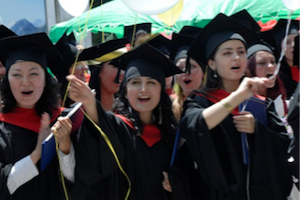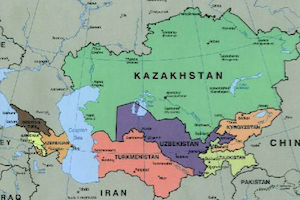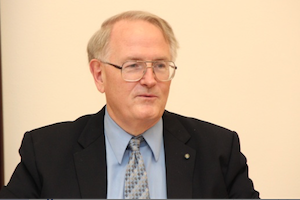Important Innovations in Higher Education: New Universities in the Caucasus, Central Asia, and Afghanistan
CACI Forum
Wednesday, Apr. 20, 2016, from 5 to 7 p.m.
(reception at 5 p.m. with Georgian wine, followed by the main program at 5:30)
New universities are rising cross Central Asia, Afghanistan, and the Caucasus, bringing innovations and jump-starting stalled processes of reform in higher education. This forum will focus on a number of these new initiatives, with authoritative presenters on several countries.
A recorded version of this event is available on the SAIS Events channel on YouTube:
Speakers:
S. Frederick Starr, Chairman, Central Asia-Caucasus Institute, JHU-SAIS
Shigeo Katsu, President, Nazarbayev University, Astana, Kazakhstan
Leslie Schweitzer, First Vice Chairman, Board of Trustees, American University of Afghanistan
Ellen Hurwitz, President Emerita, American University Central Asia (The Kyrgyz Republic)
Moderator: Mamuka Tsereteli, Research Director, Central Asia-Caucasus Institute
Rome Building Auditorium
SAIS - Johns Hopkins University
1619 Massachusetts Ave., NW
Washington, DC 20036
Click here to RSVP and register
25 Years of Promoting Democracy in Central Asia and the Caucacus: How Have We Done?
CACI Forum
Wednesday, Feb. 24, 2016, from 5 to 7 p.m.
The Freedom Support Act of 1992 (Freedom for Russia and Emerging Eurasian Democracies and Open Markets Support Act) made the "promotion of democracy" a main strategic priority of the US in the former republics of the USSR. What specific achievements can the US claim in this sphere in the Caucasus and Central Asia, and what have been its failures? To what extent does the experience of the last quarter century call for revisions in America's tactics in this area? And to what extent, if any, does experience call into question the strategy itself?
Rather than duel over the number of successes and failures, our speakers will focus on steps that might improve the effectiveness of actions to advance this strategic goal or, if necessary, more fundamental changes in the strategy itself.
The recorded version of this seminar is now available to view on the SAIS events Youtube channel.
Speakers:
Laura Jewett, Regional Director, Eurasia Programs, National Democratic Institute (NDI)
Stephen Nix, Regional Director, Eurasia, International Republican Institute (IRI)
David Kramer, Sr. Director for Human Rights and Democracy, McCain Institute for International Leadership
Moderator: S. Frederick Starr, Chairman, Central Asia-Caucasus Institute
Rome Building Auditorium
SAIS - Johns Hopkins University
1619 Massachusetts Ave., NW
Washington, DC 20036
Click here to RSVP and register
CANCELLED: Paul Goble on the Future of Post-Soviet Countries, with a Special Ceremony: "A Salute to Paul Goble"
CACI Forum with the Jamestown Foundation
We have learned from Paul Goble that he has experienced medical complications and has therefore been admitted to the hospital for observation. Because of this, he will not be able to travel to Washington for the Forum and associated events on Monday.
CACI will reschedule the Forum as soon as we receive an "all clear" from Paul Goble.
Meanwhile, his many friends send him warm wishes for a quick return to his normal routine.
Kazakhstan: An Island of Stability in a Turbulent Region
By Vladimir Socor
ISDP Policy Brief no. 191
December 22, 2015
The year now ending marked a milestone in Kazakhstan’s rapprochement with the European Union. On December 21, 2015 in Astana, the EU’s High Representative for Foreign and Security Policy, Federica Mogherini, and Kazakhstan’s Minister of Foreign Affairs, Yerlan Idrissov, signed the EU-Kazakhstan Enhanced Partnership and Cooperation Agreement. This new-generation Agreement replaces and upgrades an earlier, less ambitious document. Kazakhstan is the first Central Asian country to achieve this status vis-a-vis the European Union. This status puts Kazakhstan ahead of Russia in terms of official relations with the EU; moreover, the Kazakhstan-EU relationship is trouble-free.
Fourth Vector: Making Sense of Kazakhstan’s Activism in International Organizations
By Johan Engvall and Svante E. Cornell
ISDP Policy Brief no. 189, December 17, 2015
In the past two years, Kazakhstan has joined the World Trade Organization, obtained a seat at the Asia-Europe Meeting, signed an Enhanced Partnership and Cooperation Agreement with the European Union, announced it would host the EXPO-2017 in Astana, and launched a bid for a rotating seat at the United Nations Security Council. This extraordinary high frequency of international engagements is remarkable, but it represents a difference in degree and not nature in Kazakhstan’s diplomatic history. Indeed, since the fall of the Soviet Union Kazakhstan has developed a record of being the most proactive and innovative former Soviet republic in the sphere of international cooperation.




